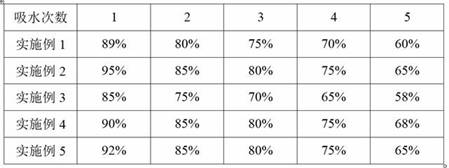High-salt-tolerance super absorbent resin
A super absorbent resin and salt-resistant technology, applied in the resin field, can solve the problems of high synthetic industrial cost, non-natural degradation, poor salt resistance, etc., and achieve the effects of low price, improved water absorption, and improved salt resistance.
- Summary
- Abstract
- Description
- Claims
- Application Information
AI Technical Summary
Problems solved by technology
Method used
Image
Examples
Embodiment 1
[0032] A highly salt-tolerant superabsorbent resin, comprising the following raw materials: 5 parts of sodium alginate, 80 parts of acrylic acid, 50 parts of acrylamide, 20 parts of chitosan, 10 parts of diatomaceous earth, and 10 parts of humic acid , 0.05 parts of an initiator, 0.3 parts of a crosslinking agent, and 0.05 parts of an antioxidant.
[0033] The crosslinking agent is one or more of N, N-methylenebisacrylamide, polyethylene glycol diacrylate, glycerol, pentaerythritol, trimethylolmethane triacrylate, sodium citrate complex.
[0034] The initiator is benzoyl peroxide or azobisisobutyronitrile or dilauroyl peroxide or di-tert-butyl peroxide.
[0035] The antioxidant is any one of 2,6-di-tert-butyl-4-methylphenol, 4-hydroxydodecanoic acid anilide, antioxidant 1076, and antioxidant 264.
[0036] The above-mentioned high salt-tolerant superabsorbent resin is prepared by the following preparation process, including the following steps:
[0037] Step 1, dissolving ch...
Embodiment 2
[0042] A high salt-tolerant superabsorbent resin, comprising the following raw materials: 10 parts of sodium alginate, 100 parts of acrylic acid, 60 parts of acrylamide, 30 parts of chitosan, 20 parts of diatomaceous earth, and 15 parts of humic acid , 2.5 parts of initiator, 5 parts of crosslinking agent, 3 parts of antioxidant.
[0043] The crosslinking agent is one or more of N, N-methylenebisacrylamide, polyethylene glycol diacrylate, glycerol, pentaerythritol, trimethylolmethane triacrylate, sodium citrate complex.
[0044] The initiator is benzoyl peroxide or azobisisobutyronitrile or dilauroyl peroxide or di-tert-butyl peroxide.
[0045] The antioxidant is any one of 2,6-di-tert-butyl-4-methylphenol, 4-hydroxydodecanoic acid anilide, antioxidant 1076, and antioxidant 264.
[0046] The above-mentioned high salt-tolerant superabsorbent resin is prepared by the following preparation process, including the following steps:
[0047] Step 1, dissolving chitosan directly in...
Embodiment 3
[0055] A high salt-tolerant superabsorbent resin, comprising the following raw materials: 8 parts of sodium alginate, 90 parts of acrylic acid, 55 parts of acrylamide, 25 parts of chitosan, 15 parts of diatomaceous earth, and 20 parts of humic acid , 0.1 part of initiator, 0.6 part of crosslinking agent, 0.5 part of antioxidant.
[0056] The crosslinking agent is one or more of N, N-methylenebisacrylamide, polyethylene glycol diacrylate, glycerol, pentaerythritol, trimethylolmethane triacrylate, sodium citrate complex.
[0057] The initiator is benzoyl peroxide or azobisisobutyronitrile or dilauroyl peroxide or di-tert-butyl peroxide.
[0058] The antioxidant is any one of 2,6-di-tert-butyl-4-methylphenol, 4-hydroxydodecanoic acid anilide, antioxidant 1076, and antioxidant 264.
[0059] The above-mentioned high salt-tolerant superabsorbent resin is prepared by the following preparation process, including the following steps:
[0060] Step 1, dissolving chitosan directly in ...
PUM
| Property | Measurement | Unit |
|---|---|---|
| particle size | aaaaa | aaaaa |
| particle size | aaaaa | aaaaa |
| particle size | aaaaa | aaaaa |
Abstract
Description
Claims
Application Information
 Login to View More
Login to View More - R&D Engineer
- R&D Manager
- IP Professional
- Industry Leading Data Capabilities
- Powerful AI technology
- Patent DNA Extraction
Browse by: Latest US Patents, China's latest patents, Technical Efficacy Thesaurus, Application Domain, Technology Topic, Popular Technical Reports.
© 2024 PatSnap. All rights reserved.Legal|Privacy policy|Modern Slavery Act Transparency Statement|Sitemap|About US| Contact US: help@patsnap.com










